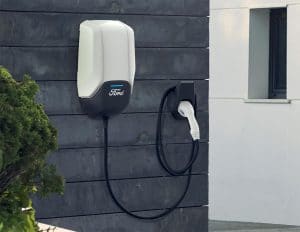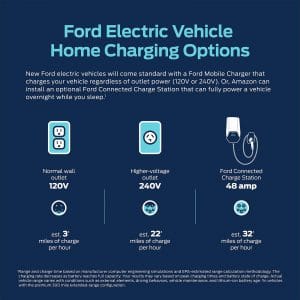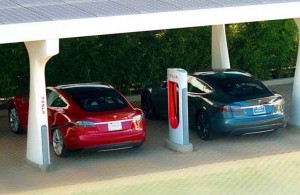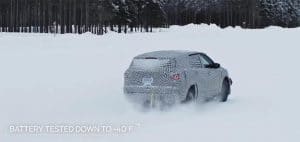
The new charging network should help Ford enhance the appeal of its upcoming “Mustang-inspired” SUV.
If battery-cars are ever to dominate the automotive market, it’s often said, they’ll need to overcome three key obstacles: cost, range anxiety and the lack of a public infrastructure. A new move by Ford Motor Co. is aimed specifically at the last of these challenges, the automaker today announcing it has set up what it is calling “North America’s largest electric vehicle public charging network.”
Teaming up with two major commercial charging companies, Electrify America and Greenlots, the FordPass Charging Network will offer buyers of the automaker’s all-electric vehicles the ability to plug in at more than 12,000 different charging stations, each averaging just under three individual chargers. By comparison, Tesla’s Supercharger network has barely 5,000 stations in North America, with barely half as many individual chargers as Ford now claims.
Ford was an early player in the electrified vehicle market and has offered a mix of plug-in hybrids and short-range EVs, such as the Focus Electric. Today’s announcement comes barely a month before the second-largest U.S. automaker is expected to unveil its first long-range model, a product it describes as a “Mustang-inspired” SUV.
(Volvo reveals XC40 Recharge, its first all-electric model; will offer 1 year free charging.)
Ford has yet to offer specific details about the upcoming battery-electric vehicle, or BEV, though it has hinted that the new model will deliver over 300 miles of range – a figure that has become something of a baseline for the industry, as a whole. Research has suggested that is more than enough for what the vast majority of American households need on a day-to-day, and even weekly, basis. Further reducing range anxiety concerns, most BEV owners currently plug in at home or office, meaning they routinely run with a battery pack that’s at least near-full.
Future Ford BEVs will come with mobile chargers allowing an owner to plug into 120 or 240-volt outlets, even while on the go. The automaker also is teaming up with Amazon Home Services which will be able to simplify the process of installing a fixed home charger. The Ford Connected Charge Station option will add more than 20 miles of range per hour.
“The fact that most of our customers will plug in at home is a key advantage to an all-electric vehicle.” said Matt Stover, Ford’s director of charging, energy services and business development. “We will deliver a charging experience that is hassle-free whether you’re at home or on-the-go.”
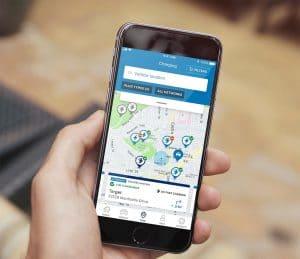
A motorist won’t have to worry about cash or credit cards to use a public station. All billing info will be contained in a special Ford app.
(Click Here for a first official look at Ford’s “Mustang-inspired SUV.)
It’s those on-the-go situations that FordPass is aimed at resolving. Trips that can top 200 miles may be infrequent but they pose a significant challenge, nonetheless. And that’s created strong demand for fast, Level 3 charging stations that can pump up current at anywhere from 50 kilowatts to as much as 350 kW at the latest facilities. Last spring, officials with Electrify America told TheDetroitBureau that, going forward, all their new stations would offer a minimum of 150 kW power.
While not quite up to what a gas pump can deliver, Ford said that owners will be able to “expect to return most of their vehicle’s charge in about the same time it takes them to grab a fast-casual meal” with a 150 kW charger.
Ford has not yet said whether it will migrate to the even faster 350 kW system with future models, but Porsche’s new Taycan can use such a charger to reach an 80% battery state-of-charge in just over 20 minutes.
One of the benefits of the FordPass system will be the ability to plug into several different charging networks without having to pay a surcharge, as is often the case now. And motorists won’t even need to pull out cash or a credit card, instead relying on a smartphone app with billing information already registered.
The number of charging stations quoted by Ford should grow rapidly, according to both Greenlots, a subsidiary of Shell, and Electrify America. The latter company is being backed by a $2 billion fund set up as part of the settlement of Volkswagen’s diesel emissions scandal.
The company is also providing services to the VW, Audi and Porsche brands. Significantly, all three of those Volkswagen Group marques will offer as much as three years of free energy to new BEV buyers. That’s becoming another popular perk for automakers aiming to entice potential electric vehicle customers. Volvo on Wednesday announced it would provide a year of free electricity at a charging network for those who buy products through its new Recharge brand, including an all-electric XC40. Ford did not announce any plans for free power.
(Porsche announces third, lower-priced version of new Taycan EV sports car.)
Going forward, both automakers and charging companies plan to simplify the process of plugging in. Last June, for example, Chargepoint and Electrify America announced a new roaming agreement that allows customers of one company to use the chargers of the other without incurring additional fees.
Such moves have made it increasingly easy for EV owners to travel long distances with fewer hassles, though the majority of public high-speed charging stations are still concentrated on the coasts and along major cross-country routes, with some gaps remaining in more sparsely populated states like the Dakotas.
Tesla has tried to address that with its proprietary Supercharger network which claims to have a fast charger within about an hour’s drive of any point in the U.S., as well as much of Canada. One advantage of the Tesla network is that owners of vehicles like the Model 3 won’t have to compete for time and space with products from other brands. Tesla uses its own proprietary plug, but it also offers adapters that allow its owners to connect to chargers operated by other vendors.
General Motors earlier this year announced a deal with Bechtel to set up a charging network similar to Tesla’s. GM currently offers just one long-range BEV but is planning an assortment of products to follow, including a Cadillac SUV and an all-electric pickup included in its new contract settlement with the United Auto Workers Union.

